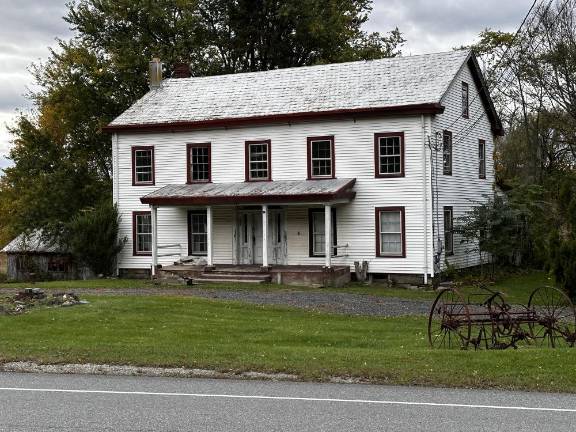Preserving Rickey farmhouse proposed
VERNON. The Chamber of Commerce is mulling over the possibility of sponsoring grant applications with the owner of Rickey Farm.

The Vernon Chamber of Commerce is mulling over the possibility of sponsoring grant applications with the owner of Rickey Farm that could result in the preservation of the farmhouse for community and nonprofit use.
“There has been discussion about converting the farmhouse into a Vernon Visitors Center,” said chamber treasurer Theresa Markham. “That could be a resource to visitors to the Appalachian Trial and Mountain Creek who could come by and learn about our history and what the different businesses in town offer them and that is the angle we are looking at this from.
“It could also serve as a place for elementary school classes to visit to learn about the dairy farm’s history and the role it played for New York City and our country. We could have community meetings there. The options are endless and options other than a visitors center are on the table.”
The first step in preserving the farmhouse, which sits on the southbound side of Route 94 across from the farm, is for the farm to be listed on the New Jersey or National Registers of Historic Places as the Hinchman-Rickey Farm.
That name recognizes the historical narrative that begins with the 1771 transfer of the farm to John and Abigail Barton Hinchman by Abigail’s father as a wedding gift.
Once the historical designation is granted, which could come by the end of the year, a process involving a series of state grant applications begins. This is where an organization, such as the chamber, may come in to play.
The first grant that farm owner Will Brown would apply for would be a planning grant. This grant would allow the farm to hire, for example, an architect to determine how much work and resources would be needed to restore the farmhouse. To secure a planning grant, the applicant is required to have at least one nonprofit group, such as the chamber, as a sponsor.
At a presentation before members of the chamber last month outlining the process, Bob Hand, a representative of Brown, estimated that a planning grant of about $20,000 would be needed to pay for an architectural consultation of the building.
Under state rules, the nonprofit sponsor of the grant would be responsible for footing $5,000 of that $20,000, assuming the grant is awarded. The state would pay the rest.
If there is an architectural plan in place for the farmhouse to have a nonprofit use, Brown would apply for a second grant. As with the planning grant, the capital grant must have at least one nonprofit group as a sponsor.
However, because the capital grant covers the cost of any building, rebuilding or renovation of the farmhouse and immediate surrounding property, its cost is likely to be much larger than the planning grant. The state grant would be for 50 percent of the renovation costs, equally matching the community’s or nonprofit contribution.
For example, if the cost to convert the farmhouse into a visitors center and/or other nonprofit community use was about $400,000, the nonprofit capital grant sponsors would have to provide $200,000.
A fundraising campaign by the capital grant sponsor or sponsors likely would be needed to come up with that 50 percent.
Ultimately, if a project using the state grants comes to fruition, the state would require a 15-year lease ensuring that the property be put to nonprofit use.
Markham, who is one of eight members of the chamber’s board of directors, said the board is deciding whether the chamber should be a sponsor of the planning grant. She reiterated that it is possible for multiple nonprofit groups to sponsor these grants.
The chamber expects to make a decision in the next month or so.
Multiple attempts to reach Hand were unsuccessful.
CORRECTION: The photo included with an earlier version of this article showed the wrong house. We regret the error.
There has been discussion about converting the farmhouse into a Vernon Visitors Center. ... It could also serve as a place for elementary school classes to visit to learn about the dairy farm’s history and the role it played for New York City and our country. ... The options are endless and options other than a visitors center are on the table.”
- Theresa Markham, treasurer, Vernon Chamber of Commerce